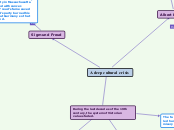HOW DO RELATIONSHIPS DEVELOP?
Two types of stages
Growing apart
terminating
participants part ways and are no longer seen by others or themselves as a couple
avoiding
while conversations may increase, so does the level of frustration and disagreement
actively avoid each other, viewing the other as in the way
stagnating
joint activities are not dynamic and require a little interaction
actively engage in other activities
circumscribing
communication interaction decreases and takes on a negative tone
the time they spend together are farther and farther apart
spend less time together
differentiating
start emphasizing individuals differences instead of their similarities and common ground
Coming Together
bonding
eg: marriage or through a joint venture like buying a house
seek to formalize the relationship
intergrating
if one is missing, people will ask about the other
recognize a relationship and start planning activities with their partner
intensifying
recognize a desire to see each other more frequently
Experimenting
continue to get to know each other better
share personal information
Initiating
making initial judgements
short conversation
Knapp's model of relational development
Offer insights into common characteristics that relationships share over time
Guide us through the discussion of common stages in relationships
How to manage interpersonal conflict?
(Stewart, 1998)
forgive and accept each other
remain calm
show the other person that you really heard what he or she said
choose a time when you will not be distracted by family or others
work it out, don't quit
avoid arguing over details. stick to the main points
show respect and empathy
stick to the subject. don't bring up old issues
do not mind read or second-guess each other
Listen to each other
Two positive ways to manage conflict
supportive climate
also characterized by spontaneous, honest, and open communication in which people ask each other's opinion and actively listen to the responses
focuses on the task or problems to be solved instead of the judgments of others
defensive climate
threatening one another's interpersonal needs
(Hocker & Wilmot, 1991) Conflict is an expressed struggle
between at least two interdependent individual who perceives incompatible goals, scarce resources, and interference from the other party in achieving their goals









